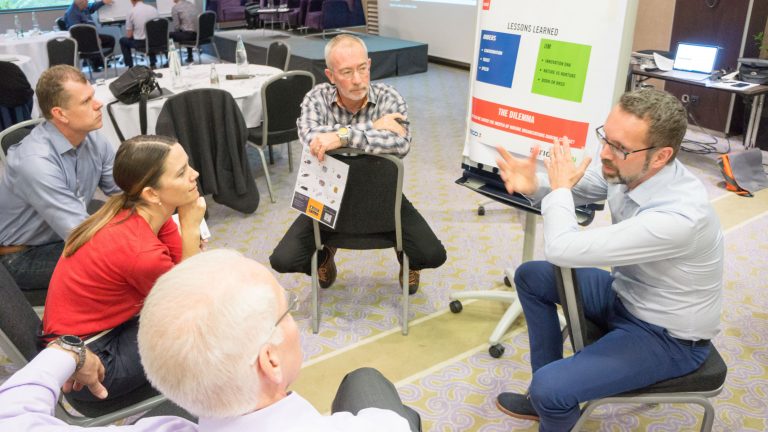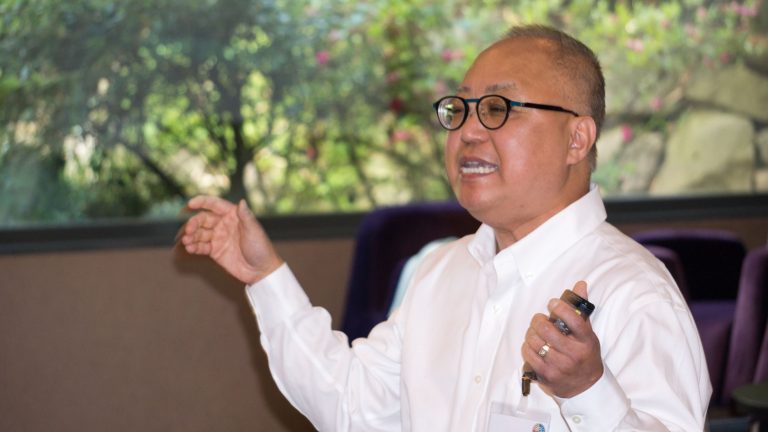Another great Global Forum this year in Paris. The annual Global Forum conference is a very unique gathering of amazing minds. It is in many ways an incredibly special network of generous, thoughtful and caring individuals. It’s a community of practice, by-invitation-only and not for profit. All the attendees are openly and informally sharing ideas and experiences. The attendees are also the presenters. I would not miss it.
SeriousFun and innovation

Jim Myrick from SeriousFun and Anders Ericsson from Seco Tools presenting
Going to Paris to innovate
What makes the Global Forum so exceptional is the open and unvarnished sharing of ideas and experiences from some of the top corporate practitioners of Action Learning. Everyone comes together each year in a different city because we really want to interact and exchange our lessons learned. The challenges facing big companies are not so different it seems. They all struggle to learn faster than the rate of change – the core principle of Action Learning. Big companies seem to be facing an increasingly difficult geo political environment balancing climate change with growth and managing a world of increasing risk and uncertainty. The need to include a digital strategy emerged this year in Paris along with the drive to innovate as top concerns for all.
Some of the highlights
It is hard to pick favorites when blessed with such riches. Everyone was inspiring and super well informed as always. This year covered some topics that I am particularly interested in like digital transformation and innovation so I found these presentations very compelling. One take away also was how many companies tried to foster innovative thinking and doing, many really expended considerable efforts to the process only to fall short when it came to long term impact. It was curious how many companies put forth the effort and committed to various programs often with little upfront KPI’s only to come up short with implementation. It seems that the transition from ideation and experimentation to implementation into a real business unit or a long-term change agent remains elusive.

Not sure if it was reassuring to hear from Drew Boyd Associate Professor at University of Cincinnati and Author that in his experience resistance is expected and perhaps a welcome signal that one is being truly disruptive. He explained that many people will visualize the benefits of change and disruption while inevitability some will harbor feelings of resistance. This is completely normal and should be expected according to Drew. If no one feels uncomfortable with your proposal then this is a clear sign you are not actually being too disruptive after all. The take away for the true innovators is to look for and expect some resistance from stakeholders if you are doing your job.

Michael Diebold’s session was very interesting to hear about his experience teasing new products out of traditional and established companies. It was fascinating to hear about how he has been able as an outsider to get employees to open up with their innovative ideas. He explained that from his experience many engineers inside of big companies actually have in their back pocket very interesting new product and business ideas. The trick in his experience is giving these inventors a safe place to bring their ideas to life and see them become real. The challenge he has seen for big companies is how to liberate all of this creative energy in a productive and rewarding fashion.

Kenneth Rhee Professor and Dean, School of Business and Leadership, Nazareth Collage led us all through a fascinating discussion on the Lessons Learned and Issues in Designing an Artificial Intelligence (AI) Business and Leadership Programs at the Collage. The consensus in my group was that AI was near at hand with far ranging implications raised by Kenneth. This was a great session with many mind-boggling concepts, possibilities, and risks debated by the very engaged group. While general purpose AI is years off or may never become a reality current AI technology is already bringing forth important challenges in business touching on issues such as how to properly prepare our next generation of business leaders to implement AI with a moral and ethical compass.

Michellana Jester, Lecturer, Global Economics and Management, MIT Sloan School of Management delivered a session of keen interest for me on “How trends in learning may help businesses advance their employees’ development”. She started off challenging our group on our false beliefs about how the brain actually works. Seems we have all bought into the concept of a right brain person or a left brained person or the notion that we only use 10% of our brains capacity. Come to find out most of the things we hold as true about our brains is actually false. What I find so fascinating about her work is the novel intersection of AI and neuroscience she is addressing.
In conclusion it was another not to be missed Global Forum reconnecting with friends, making new connections and learning a lot from all the attendees. The only negative is the pace that Yury puts us all though. It was a jam packed few days with no time for anything other than learning faster than the rate of change.

